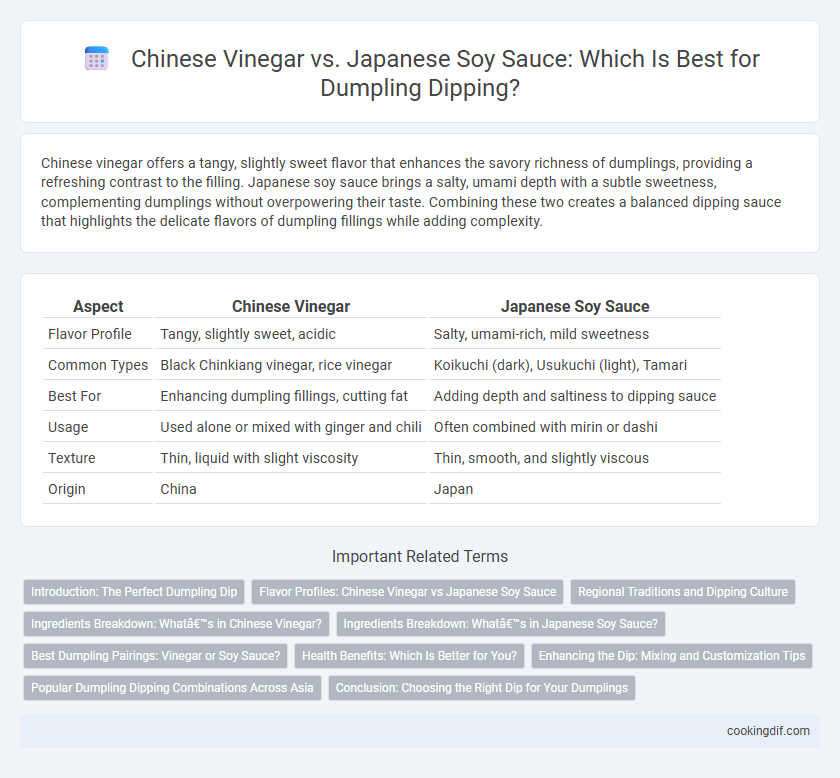Chinese vinegar offers a tangy, slightly sweet flavor that enhances the savory richness of dumplings, providing a refreshing contrast to the filling. Japanese soy sauce brings a salty, umami depth with a subtle sweetness, complementing dumplings without overpowering their taste. Combining these two creates a balanced dipping sauce that highlights the delicate flavors of dumpling fillings while adding complexity.
Table of Comparison
| Aspect | Chinese Vinegar | Japanese Soy Sauce |
|---|---|---|
| Flavor Profile | Tangy, slightly sweet, acidic | Salty, umami-rich, mild sweetness |
| Common Types | Black Chinkiang vinegar, rice vinegar | Koikuchi (dark), Usukuchi (light), Tamari |
| Best For | Enhancing dumpling fillings, cutting fat | Adding depth and saltiness to dipping sauce |
| Usage | Used alone or mixed with ginger and chili | Often combined with mirin or dashi |
| Texture | Thin, liquid with slight viscosity | Thin, smooth, and slightly viscous |
| Origin | China | Japan |
Introduction: The Perfect Dumpling Dip
Chinese vinegar, particularly Chinkiang vinegar, offers a rich, tangy flavor that complements the savory filling of dumplings by cutting through their richness. Japanese soy sauce, known for its balanced salty and umami profile, enhances the natural flavors without overpowering the delicate wrapper. Combining Chinese vinegar with a splash of soy sauce creates the ideal dipping sauce that highlights the authentic taste and texture of dumplings.
Flavor Profiles: Chinese Vinegar vs Japanese Soy Sauce
Chinese vinegar offers a tangy, slightly sweet flavor with a rich umami depth that enhances the savory filling of dumplings, providing a balanced acidity that cuts through greasiness. Japanese soy sauce delivers a lighter, saltier taste with subtle sweetness and umami, complementing dumplings with a clean, refined finish. The choice between the two depends on whether you prefer a sharp, acidic bite from Chinese black vinegar or the smooth, savory notes of Japanese soy sauce for dipping.
Regional Traditions and Dipping Culture
Chinese dumpling dipping often features black Chinese vinegar, prized for its rich, tangy flavor that complements the savory filling and balances the dough's mildness, reflecting the region's preference for bold, sour notes. Japanese dumpling dipping traditionally uses soy sauce combined with a touch of rice vinegar or citrus, emphasizing subtle umami and light acidity that aligns with Japan's delicate taste profiles and minimalistic dipping culture. These regional variations highlight how local culinary traditions shape the preferred condiment, enhancing the dumpling experience through distinct flavor pairings.
Ingredients Breakdown: What’s in Chinese Vinegar?
Chinese vinegar, especially Chinkiang vinegar, is primarily made from fermented glutinous rice, wheat, and sorghum, resulting in a rich, dark, and slightly sweet flavor profile. Its complex fermentation process develops organic acids, amino acids, and sugars that enhance dumpling taste with subtle umami and tangy notes. Unlike Japanese soy sauce, which is high in sodium and derived from soybeans and wheat, Chinese vinegar offers a lighter, sour complement ideal for balancing greasy or savory fillings in dumplings.
Ingredients Breakdown: What’s in Japanese Soy Sauce?
Japanese soy sauce, or shoyu, is primarily composed of soybeans, wheat, water, and salt, creating a balanced umami flavor essential for dumpling dipping. The fermentation process breaks down proteins into amino acids like glutamate, enhancing savoriness compared to Chinese vinegar's acidic maltose and acetic acid content. Unlike Chinese vinegar's tangy profile derived from fermented grains, Japanese soy sauce offers a rich, slightly sweet, and salty taste that complements the delicate filling of dumplings.
Best Dumpling Pairings: Vinegar or Soy Sauce?
Chinese dumplings are traditionally paired with black vinegar, which enhances their savory flavor with a tangy, slightly sweet acidity that balances the richness of the filling. Japanese soy sauce, known for its umami depth and saltiness, offers a robust complement but can overpower delicate dumplings if used alone. For the best dumpling dipping experience, a blend of Chinese black vinegar with a splash of Japanese soy sauce creates a harmonious balance of sourness and umami, elevating every bite.
Health Benefits: Which Is Better for You?
Chinese vinegar, especially black vinegar, offers antioxidants and aids digestion, making it a healthier option for dumpling dipping compared to Japanese soy sauce. Japanese soy sauce tends to be higher in sodium and less rich in beneficial compounds, which may impact blood pressure and heart health negatively if consumed in excess. Choosing Chinese vinegar can support better digestive health while providing a flavorful yet lower-sodium alternative for enjoying dumplings.
Enhancing the Dip: Mixing and Customization Tips
Chinese vinegar offers a tangy and slightly sweet flavor that brightens dumpling dipping sauces, while Japanese soy sauce provides a salty, umami-rich base ideal for balancing richness. Combining Chinese vinegar with Japanese soy sauce creates a harmonious blend that enhances the overall taste profile. Customization options include adding minced garlic, chili oil, or sesame seeds to adjust heat, aroma, and texture, elevating the dipping experience.
Popular Dumpling Dipping Combinations Across Asia
Chinese vinegar, particularly Chinkiang black vinegar, offers a tangy and slightly sweet flavor that complements the richness of dumplings, commonly paired with minced garlic or chili oil for a balanced dipping sauce. Japanese soy sauce, often combined with a touch of rice vinegar and wasabi or grated ginger, provides a salty and umami-rich profile favored in Japanese dumpling (gyoza) dipping. Across Asia, popular dumpling dipping combinations vary from the sour and savory Chinese black vinegar blends to the savory and piquant Japanese soy-based sauces, highlighting regional flavor preferences that enhance the dumpling experience.
Conclusion: Choosing the Right Dip for Your Dumplings
Chinese vinegar offers a tangy, slightly sweet flavor that complements the rich, savory taste of dumplings by cutting through their fat and enhancing the filling's umami. Japanese soy sauce, with its saltier and more robust profile, intensifies the dumpling's meatiness and adds depth without overpowering the delicate wrappers. Selecting the right dip depends on personal preference: choose Chinese vinegar for a lighter, balanced contrast or Japanese soy sauce for a stronger, salt-forward accompaniment.
Chinese vinegar vs Japanese soy sauce for dumpling dipping Infographic

 cookingdif.com
cookingdif.com